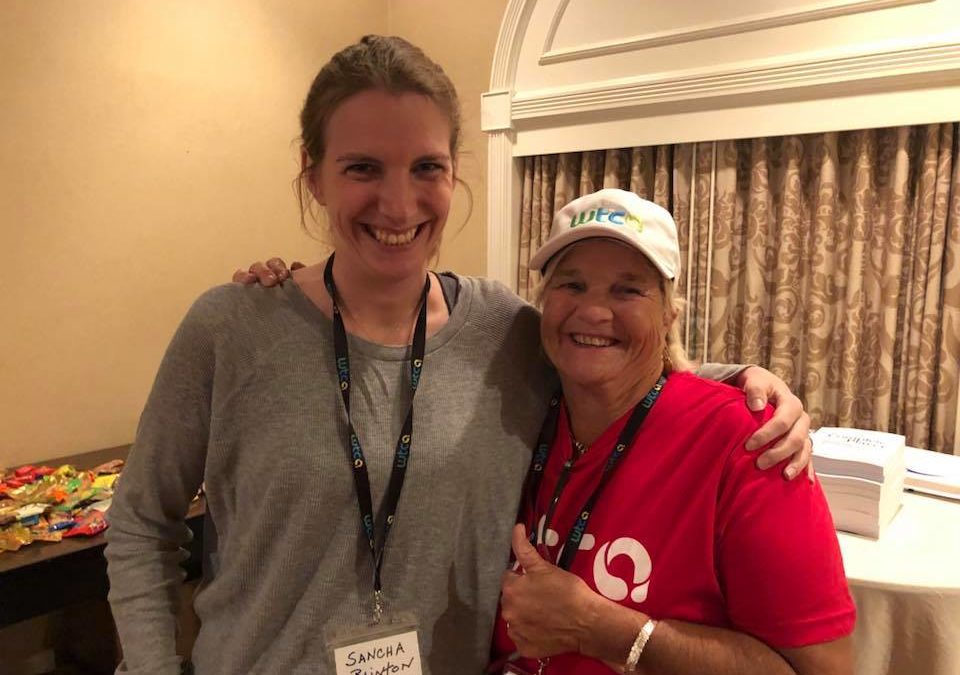Tennis is an individual sport, but there is no denying the importance of teamwork within the inner-workings of both coaching and preparing an athlete to succeed on and off the court. According to USPTA Hall of Fame coach Anni Miller, teamwork is the essence of success within the profession.
Tennis has always been a family affair for Miller. In fact, her great uncle built San Diego’s first tennis court. Growing up in a tennis hotbed, Miller followed in the footsteps of her mother, father and older brother. She went on to captain her high school tennis team and even bring about the resurgence of a famous tennis tournament in Southern California.
“As a junior in high school, I helped to bring this huge tournament back to La Jolla where I grew up. At early ages, I was always involved in administering and getting myself into different projects within the sport,” recalled Miller.
After playing collegiately at the University of Oregon, Miller took a hiatus from tennis due to her marriage and the birth of her children. However, she was called back to the sport to administer lessons and manage the pro shop back in her hometown. Due to the success she experienced, she was asked to be the head tennis pro at her new home in Oregon, which would eventually lead her on a journey as a pioneer for female coaches in the sport.
“I joined the USPTA, joined the PTR, went to conferences and seminars and tried to learn as much as I could so I could stay a real factor in the ‘old boys club,’’ said Miller. “That’s how I got my start and I decided that I truly enjoyed coaching and could make a career of it. This was during the boom years of tennis in the 70s and I was a big part of that.”
Hailing from Southern California, Miller grew up with some of the sports’ greats – Billie Jean King, Karen Hantze and Valerie Ziegenfuss among many other talented players. Miller remembers learning the significance of teamwork from the relationships she built with her competition, who also became some of her closest friends.
“We were always really friendly, and we didn’t recognize all the steep competition. We all wanted to win, but we didn’t want to win at all costs. We all learned from each other and that’s where I began to learn the benefits of teamwork,” explained Miller.
Miller later relied on teamwork to transform her club in Oregon into a multigenerational program with over 4,000 members. “The club was a huge undertaking for somebody who didn’t know the ropes in Oregon coming up from Southern California. I needed a lot of support and a lot of people aren’t very friendly when a new person comes to town, so I had to develop relationships to build a sound support system around me to survive the old boys network,” she said.
Coupled with the relationships she built, Miller also relied on advice from her mother and grandmother, who were trailblazers in their respective careers. “My mom was and is the biggest influence in my life. She was the one I bounced most of my ideas off of because she always had such knowledgeable responses from experiences in her life. Both her and my grandmother went to college, they both graduated. That education and wisdom was something that could guide me,” she said.
“To develop relationships within the industry, I had to use my best smarts that I learned from growing up in a really good family environment,” explained Miller. “Part of it was having good character, being honest, being caring, being a good listener and not thinking that everything I did was the only way. I wasn’t afraid to ask for help. I went to all the top tennis minds and spent time with them to learn how to be successful.”
According to Miller, all coaches, particularly women, should actively seek out a support system to guide them through the highs and lows the profession. “Surround yourself with greatness and learn from people you can trust and will always have your back,” she urged.
“Seek out as much education as possible. Try to be assertive and knowledgeable about the goals you have,” said Miller. “Our business model has caused female coaches to get stuck because they are kept in certain niches. We really need top level women in tennis in order to have young girls aspire to not only play tennis but to become coaches and role models.”
Miller’s advice sits at the core of the WTCA’s mission – to keep young girls and women in the sport. As the Director of Development, Miller strives to bring that same sense of teamwork to her role within the WTCA.
“We’re all willing to share our talents and life experiences for this purpose that we’re all passionate about. It makes for a really successful team, and not one person could be doing this alone. It takes a village to do this and that’s why team is so much like family,” she said.
Despite the status quo, maybe tennis is not truly an individual sport after all.

